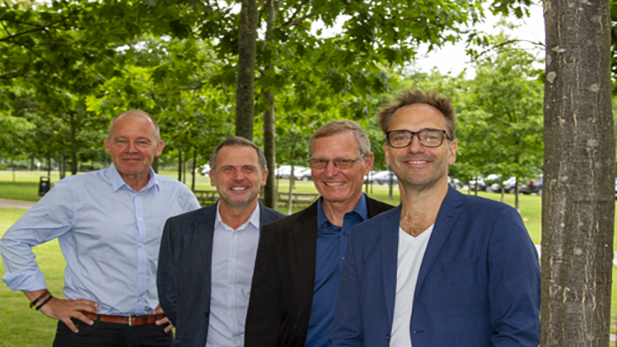3000+ CBS students get Power-to-X competences

Associate Professors, Carsten Scheibye, Tamás Vámosi, Eric Bentzen and Head of Department, Carsten Ørts Hansen are in charge of using PtX as case in the teaching of more than 3000 students in the academic year, 2021-22.
The UN’s Climate Panel’s sixth assessment report on climate change, published this August, is a highly topical reminder that new ventures, such as Power-to-X (PtX), will be pivotal in the global – and the Danish - climate efforts, and the possibilities of reducing the scope of the current climate crises. Basically, PtX concerns the transition of green energy to hydrogen and other sustainable fuels that can replace fossil fuels in e.g. ships, aero planes, trucks and heavy industry.
PtX will become a main theme in the teaching during 2021-22 in the subjects Managerial Economics and Organizational Economics in the HD and the BSc in Economics and Business Administration. Concretely, this means that in the summer of 2022, more than 3,000 CBS students will be able to analyse and discuss a highly relevant subject on the societal agenda.
FOCUS ON ONE THEME
Carsten Ørts Hansen, Head of Department at the Department of Operations Management at CBS highlights the initiative as an expression of CBS’ continued efforts to engage researchers and students in current debates on societal issues. The extensive efforts over the past few years to create interconnected subject modules across study programmes is now rendering it possible for a large group of students to focus on one specific theme. And this is what is happening now, with PtX.
“We are not changing the subjects we teach, but we adjust the context used in the teaching. Our students will then use the theories and analytical approaches taught at CBS to make competent analyses and suggestions for concrete PtX challenges,” says Carsten Ørts Hansen.
He adds that PtX is included by way of concrete cases, which are used in the teaching and the exams. During the coming year, CBS will start collaborations with the companies that are already active within the PtX area, and engage students in the current problems these companies face.
“The final decisions about which investment projects with a PtX focus will be continued, will to a great extent be based on business economics analyses – and this is something our students must master and contribute actively to. Both when they work with concrete cases in teaching, and, later on, when they join the labour market,” adds Hansen.
CLASSIC MANAGERIAL ECONOMICS
Carsten Ørts Hansen points to the fact that the climate crisis requires that we develop and accelerate solutions, which are still only small scale – and where the potential is still unknown. This is also true of PtX. A successful green transition is not least dependent on the ability to upscale production and downscale costs, which is actually classic managerial economics, he points out.
“In relation to PtX, we need to initiate demonstration projects that we can analyse and use as basis for calculation, as a point of departure for identifying the scaling possibilities and the commercial industrialization. For example, we can teach the students to develop analyses of incentives, costs and financing options and thus create a basis for investment decisions. These are all important steps on the road to clarifying how new PtX concepts can become competitive alongside current energy solutions,” he states.
RESEARCH ON PtX
In addition to focusing specifically on PtX in the teaching, CBS has also initiated a number of research projects in this area. This includes, for example, a project on the decarbonization of the maritime sector. The results from this project and from other PtX related research will be communicated through several seminars as well as other activities, which are open to all interested parties and will be announced on CBS’s webpage.
“Collectively, our efforts reflect how we at CBS through teaching and research activities work targeted with accelerating the green transition in society at large. Because it is one thing to make political decisions, quite another to secure their implementation, which is contingent on the availability of knowledge and competences that can unfold the possibilities,” Hansen emphasizes.
He explains that the Department of Operations Management at CBS would like to reach out to companies that are already active within the field of PtX with a view to start collaborations on concrete cases for the teaching in the Economics degree and the Bachelor of Commerce. During 2021-22, cases from both large, medium and small companies will be used.
WANT TO KNOW MORE?
You are welcome to contact one of the following faculty members, if you wish to engage in a dialogue about PtX:
Head of Department, Carsten Ørts Hansen – ch.om@cbs.dk
Associate Professor, Tamas Vamosi – tv.om@cbs.dk
Teaching Associate Professor and Programme Director, Carsten Scheibye – cs.om@cbs.dk
Associate Professor, Eric Bentzen – eb.om@cbs.dk